Role of Mosquito Alpha-glucosidase in the Larvicidal Activity of Bacillus sphaericus
Main Article Content
Abstract
Abstract
Bacteria harmless to mammals and other insects have been proposed as a mosquito larvicide.Bacillus sphaericus is safe and can kill mosquito larvae by producing binary toxin (Bin).The mechanism of Bin against larvae is unclear; the protoxins (BinA and BinB) are activated byendogenous serine proteases to form active toxins. BinA and BinB form protein complexes withglycosylphosphatidylinositol membrane bound alpha-glucosidase, which acts as a receptor in Culexpipiens (Cpm1), Culex quinquefasciatus (Cqm1), and Anopheles gambie (Agm3) larvae. Since alphaglucosidasesplay important roles in mosquitoes, we describe the biochemical properties, and roles ofalpha-glucosidase, including the digestion of sugar and the effect of Binary toxin on mosquito larvae.Transposable-element like DNA insertion into the coding sequence, which induces a new mRNAsplicing event, or a nonsense mutation found in an alpha-glucosidase gene, is evidently associated withresistance of mosquitoes to the toxicity of B. sphaericus. Understanding alpha-glucosidase, which acts asa receptor for B. sphaericus producing-binary toxin, is essential for microbial larvicide development.
Keywords: alpha-glucosidase, Bacillus sphaericus, Binary toxin, mosquito

